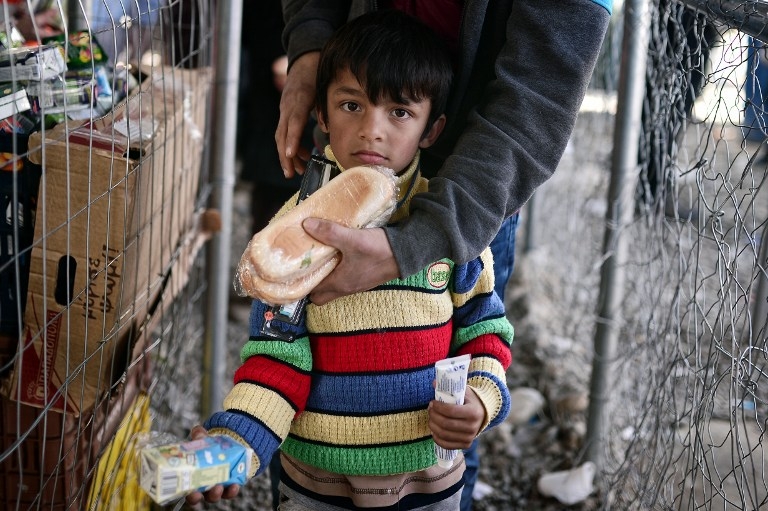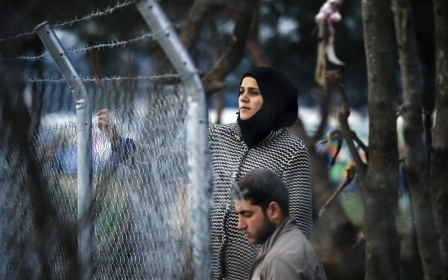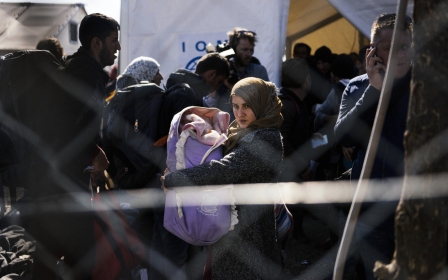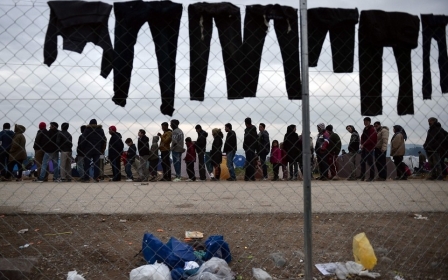Merkel denies West Balkan refugee route to close as EU leaders meet

Tensions among EU leaders over plans to stop the flow of refugees through the west Balkans emerged from a meeting in Brussels on Monday, with Chancellor Angela Merkel insisting that the route would not be closed.
An earlier draft of the EU statement was circulated saying the route that saw 1.2 million people reach Europe during 2015 would be shut down: “Irregular flows of migrants along the western Balkans route are coming to an end; this route is now closed.”
However Merkel and EU Commission chief Jean-Claude Juncker refuted this, saying the route would remain open to Syrian and Iraqi refugees.
The differences over the policy emerged as European Union leaders met Turkish Prime Minister Ahmet Davutoglu on Monday in Brussels as they attempted to shore up an earlier agreement for Turkey to halt the flow of refugees through its territory to Europe in exchange for funding support.
EU officials had indicated on Sunday that an announcement of plans to stop the flow of people attempting to make their way north from Greece would form part of a declaration issued at the end of Monday's summit in Brussels.
The bloc's 28 leaders will also ask Davutoglu's government to accept "large-scale" deportations of economic migrants from Greece, the main entry point to Europe, and do more to implement a November deal to slow the flow of people into the bloc.
Turkish President Recep Tayyip Erdogan, however, criticised the EU for a four-month delay in disbursing a promised €3bn fund for refugees agreed under the November agreement.
"It's been four months. They are yet to deliver," Erdogan said in a speech in Ankara on Monday.
Greece has seen non-EU Macedonia and EU countries on the western Balkans route virtually shut their borders in a domino effect, trapping Syrian and other asylum seekers desperate to head north to wealthier Germany and Scandinavia.
But a spokesperson for German Chancellor Angela Merkel said on Monday that suggestions that the Balkan route would be closed were "speculation" and talks were still going on.
"I indeed have taken note of reports that there is speculation about the closure of the Balkans route, but I want to say that this is speculation at the moment," said spokesperson Christiane Wirtz.
"The negotiations and talks are ongoing and we have to wait."
Many people have died in accidental drownings when over-loaded boats have capsized while attempting to make the Aegean crossing from Turkey to Greece, with 25 people killed in the latest incident on Sunday.
Last week, Syrian refugees stuck in a camp of 12,000 people at the Macedonian border told Middle East Eye that they expected it would take them a month to cross the border, with many running out of money and living in squalid conditions while they wait.
An EU diplomat told journalists that European leaders would declare on Monday that they would "close the Balkans route in the coming days," ending the "wave-through approach" to refugees and migrants that has caused chaos and tension in Europe.
Another diplomat confirmed that the language contained in an earlier draft declaration remained unchanged. The diplomat cautioned that delegations were still looking at the draft, as is always the case before a summit.
Brussels on Friday unveiled a plan to restore by the end of the year the full functioning of Europe's cherished passport-free Schengen zone after the series of border closures.
It was timed with calls for not only better cooperation from Turkey but also the creation of an EU coastguard force by the summer and help for Greece to strengthen its external border.
EU leaders are set to stand by Greece after having last week promised 700mn euros ($780mn) in emergency aid for the country and other states to help them manage the influx at their borders.
Greek Prime Minister Alexis Tsipras on Sunday demanded the "urgent" relocation of thousands of refugees to other member states.
The bloc adopted a scheme last September to relocate 160,000 asylum seekers from Greece and Italy, but fewer than 700 people have actually been moved.
Donald Tusk, the European Council president and summit host, said in his invitation letter that success depended largely on securing Turkey's agreement for the "large-scale" readmission from Greece of economic migrants who do not qualify as refugees.
Syrians, who top the influx of people into Europe, are considered genuine refugees requiring admission under international law.
Davutoglu told reporters at Istanbul airport before leaving for Brussels that Turkey had taken "important steps" to fulfil its part of the stalled November deal.
He said there had been a drop in numbers, but "not a dramatic decline" because of the ongoing civil war in neighbouring Syria.
2,000 arriving each day
Despite progress, the EU said too many people were still heading from Turkey to Greece, with nearly 2,000 arriving daily in February.
The Financial Times newspaper reported on Sunday that Brussels had drafted a proposal to centralise the system for processing asylum applications, removing the current rule that requires asylum seekers to lodge their claim in the first EU country they arrive in.
The proposal is part of a radical overhaul of its refugee policy to be announced at a summit on 17 March.
Just ahead of the Brussels meeting at least 25 migrants, including 10 children, died after their wooden boat capsized trying to reach Greece, the Turkish coastguard said. Fifteen people were rescued off the Turkish coastal town of Didim on Sunday.
Turkey on Monday detained two people, including the owner of the boat, over the accident.
Turkey is the launch pad for most of the more than one million refugees and migrants who have come to the continent since early 2015.
Davutoglu said he would discuss with his EU counterparts efforts to start building schools and hospitals within weeks for refugees with the three billion euros ($3.3 billion) pledged by Europe under the November deal.
Outspoken Czech President Milos Zeman said the EU should not give Turkey the funds because it was "neither ready nor capable" of helping migrants. "It's only wasted money," Zeman told TV Prima.
Nato Secretary General Jens Stoltenberg meanwhile said the alliance was broadening its new mission in the Aegean Sea to stop migrant smugglers while working more closely with the EU border agency Frontex.
Middle East Eye propose une couverture et une analyse indépendantes et incomparables du Moyen-Orient, de l’Afrique du Nord et d’autres régions du monde. Pour en savoir plus sur la reprise de ce contenu et les frais qui s’appliquent, veuillez remplir ce formulaire [en anglais]. Pour en savoir plus sur MEE, cliquez ici [en anglais].




